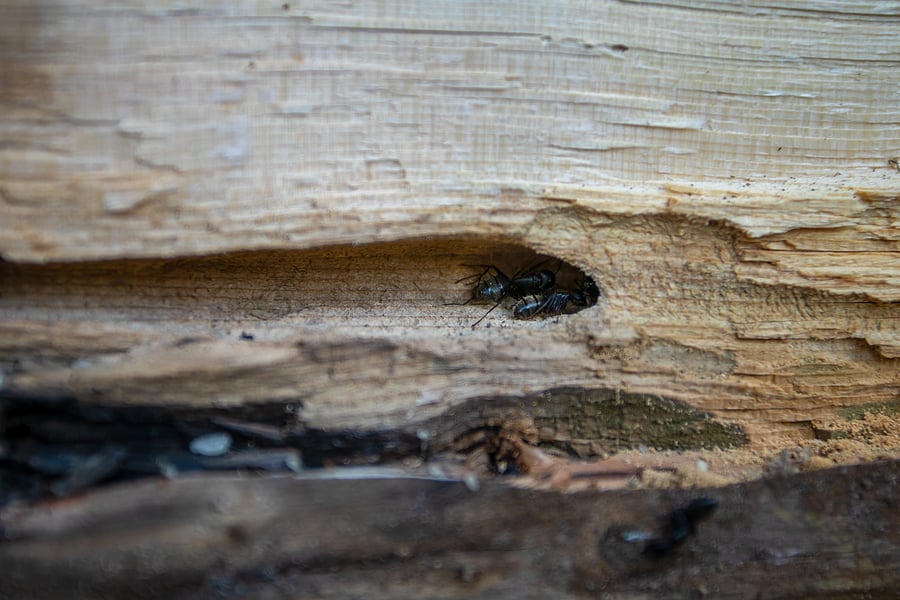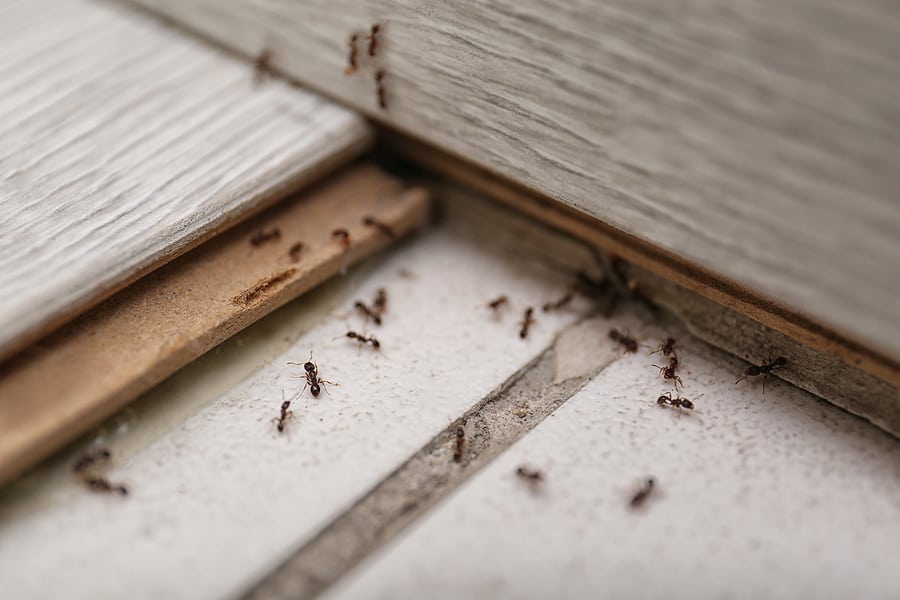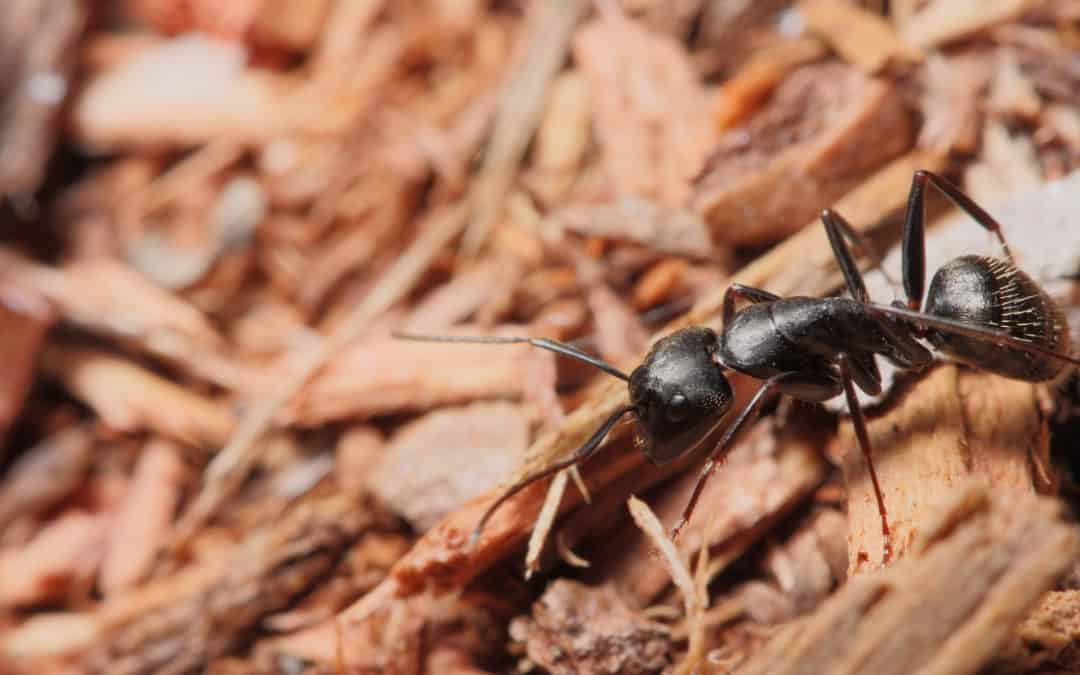READY TO GET STARTED?
REQUEST A FREE ESTIMATE
Fill out the form below or call (888) 466-7849 for a free, no-obligation estimate.

Ant infestations are a common household nuisance in Georgia, where warm temperatures and humidity create ideal conditions for these tiny invaders. Whether they’re in your kitchen, bathroom, or backyard, ants can be a persistent problem that requires proactive pest control solutions and, oftentimes, the use of an ant control company. Understanding the types of ants found in Georgia, how to eliminate an ant infestation, and the best prevention strategies will help restore peace of mind in your home.
Several species of ants frequently invade homes across Georgia. Identifying the type of ant you’re dealing with is the first step in determining the right ant control solution.
Discovering ants invading your home can be frustrating, but with the right approach, you can get rid of ants and prevent them from returning. Here’s how:
Ants typically enter homes through tiny cracks, gaps, and openings around windows, doors, and plumbing. Inspect your home thoroughly and seal any potential entry points to cut off their access.
Ants are drawn to food crumbs, spills, and standing water. Keep your kitchen clean by wiping down surfaces, storing food in airtight containers, and fixing leaky pipes to eliminate moisture.
Certain natural ingredients can help deter ants from invading your home:
Ant baits are an effective method for controlling colonies. The ants carry poisoned bait back to their nest, eliminating the entire colony over time. Be patient, as bait traps can take several days to work.
If DIY methods don’t resolve the ant problem, it’s best to seek help from an experienced ant control company. Professional ant exterminators near you will assess the infestation, identify the species, and apply targeted treatments for long-term results.
Preventing an ant infestation is easier than dealing with one. Here are essential pest management tips to keep ants from invading your home:
While some homeowners may attempt to handle an ant infestation on their own, professional pest control services offer a more effective and long-lasting solution. Here’s why hiring an ant control company is beneficial:
Ants invading your home can be a persistent and frustrating problem, but with the right approach, you can eliminate them and prevent future infestations. Whether you need immediate assistance or ongoing pest management, partnering with a reputable pest control company will ensure your home remains ant-free.
If you’re struggling with an ant infestation, don’t wait until the problem worsens. Contact a trusted ant control company today for a consultation and enjoy the peace of mind that comes with expert pest control services.

Ants are small, annoying, and can sometimes lead to health risks. Finding them infested in your home is always alarming! There are several ant species found in the Fort Myers area, including ghost ants, white-footed ants, and carpenter ants. Once these pests infest your home, it can be extremely difficult to get rid of them. Check out our top 3 signs you need ant control for your home.
Carpenter ants are known to nest in damaged wood, especially wood that is damp from water. Their damage includes excavating wood to create their nests and creating holes. If you notice small trails of sawdust around, inside, or outside the home, it’s likely that you have ants.
Look for piles of sawdust near wooden beams, window ledges, skirting boards, and wood flooring. If you find sawdust or even the holes they create, it’s a sign that carpenter ants have infested.
Did you know that some ant types have wings for a short time? These ‘flying ants’ will usually swarm during the summer when a younger queen leaves the nest to start their own colony. If you notice discarded wings on the floors, windowsills, or doorsills, an ant colony could be inside the home.
One of the more serious signs of an ant infestation is noticing that your home’s wood structures are crumbling when touched. This is a sign that the home structure is weakened, sometimes caused by ants. Often, the wood can look normal from just looking at it, but a tell-tale sign if ants have infested is finding hollow-sounding wood that is weak under pressure.
To prevent ants, utilize these preventative measures throughout your home,

Little black ants are a common household pest usually seen in larger swarms during the warmer months of the year. These ants can be a huge nuisance, commonly infesting areas such as the bathroom and kitchen, searching for food and a place to nest. Once ants become a problem, it can be difficult to control them; but with some easy preventative measures, you’re less likely to encounter these pests!
Ants are always in search of food. Eliminating any food source that they have easy access to will be a major part of preventing them. After every meal, wipe down countertops and tables of any food crumbs or spills left behind. Don’t forget about your appliances either; ensure that your stove, microwave, and sink are also cleaned frequently. To prevent these pests from infesting your pantry, use sealed containers for any dry goods. Consider placing a bay leaf in canisters of dry food like flour to repel ants.
To survive, ants need water. Eliminating moisture throughout your home is key to ant prevention. Take some time to look around the interior and exterior of your home. If you notice any leaks, make sure you repair them immediately. Check your gutters often to make sure there are no clogs. Consider installing gutter guards to help prevent clogs. Additionally, make sure that the downspout is directing away from your foundation.
Being as little as they are, ants only need a small gap or hole to make their way inside. It’s essential to identify entry points and seal them properly to avoid infestation. Look around the interior and exterior of the home to look for these gaps. Popular places include areas where pipes and wires enter your home. Check your windows and door screens for any open holes and replace weatherstripping frequently.
Preventing ants can be difficult and feel impossible. If you’ve noticed an increase in ant activity around your home, consider contacting your local pest control provider. These professionals will complete a thorough and comprehensive treatment and control plan.

Every homeowner dreads discovering an ant infestation, whether inside or outside the home. Ants can be a major nuisance as they contaminate food, build their nests in unwanted places, and destroy property. One type of ant in particular, the carpenter ant, is considered a “silent destroyer,” often causing severe damage to homes undetected by excavating wood. These pests can be tough to eliminate but it is possible.
Carpenter ants are ½” to 5/8” long, and are usually red, black, brown, or a combination of these in color. These ants build their nests by creating smooth tunnels inside wood, preferring wet, damp wood. Common places carpenter ants will build their nests include tree stumps, fence posts, window and doorframes, firewood, and other various places with exposed wood. Carpenter ant nests can be problematic to your home as the tunnels they create can damage the structural soundness of wood throughout your property. If you notice sawdust or wood fragments falling throughout your property, there is a good chance that carpenter ants have infested.
Carpenter ants need a constant water source to survive. The first step in preventing ants like these is to eliminate moisture or standing water throughout your property. Consider using a dehumidifier in crawlspaces, basements, and attics to help with dampness. Trim your tree branches and shrubs away from your home, as ants can use these as an access point. Take it a step farther by looking around your property for any gaps or holes and sealing these up with caulk, as ants only need the smallest gap to get inside a house.
Preventing ants might seem like a daunting task; when ants infest it can seem like they are everywhere! Consider reaching out to your local pest control company where they can provide you with a prevention and treatment plan during peak ant season.